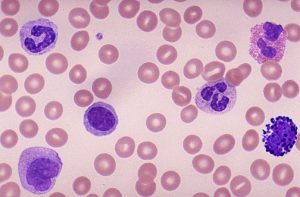What does the blood do? (8 functions)
In this article we will describe what does the blood do. Let’s start with the basics.
What is blood?
Blood is a vital fluid that circulates throughout the human body, delivering essential substances to various tissues and organs while removing waste products. Here are 7 key functions of blood:
1. Oxygen transport – blood carries oxygen from the lungs to all the cells in the body. Oxygen binds to a molecule called haemoglobin, present in red blood cells, and is transported to tissues where it is required for cellular respiration.
2. Nutrient delivery – blood transports nutrients such as glucose, amino acids, fatty acids, vitamins, and minerals from the digestive system and storage sites (such as the liver) to the cells throughout the body. These nutrients are necessary for energy production, growth, and maintenance of bodily functions.
 Blood film
Blood film
3. Waste removal – blood collects waste products, such as carbon dioxide and metabolic byproducts, from the cells and carries them to the lungs for elimination through exhalation. Other waste products are filtered by the kidneys and eliminated as urine.
4. Hormone transport – blood carries hormones, which are chemical messengers, from the endocrine glands to target organs and tissues. Hormones regulate various processes in the body, including growth, metabolism, reproduction, and mood.
5. Temperature regulation – blood helps regulate body temperature by absorbing heat from active tissues and transferring it to other parts of the body; where it can be released, helping to maintain a stable internal temperature.
6. Immune response – blood contains white blood cells (leucocytes) that are an integral part of the immune system. They help defend the body against pathogens, such as bacteria, viruses, and fungi; by recognising and eliminating them.
7. Clotting – blood contains platelets that play a crucial role in the clotting process. When a blood vessel is damaged, platelets aggregate at the site to form a clot; preventing excessive bleeding, and allowing the damaged vessel to heal.
8. pH balance and fluid balance – blood helps maintain the body’s pH balance by absorbing excess acids or alkalis. It also assists in maintaining fluid balance by distributing fluids between the cells and various body compartments.
These functions highlight the crucial role of blood in maintaining overall health and proper functioning of the body’s systems.
Summary
We have described what does the blood do (8 functions). We hope it is clearer now.
Last Reviewed on 12 March 2024
